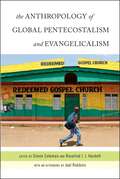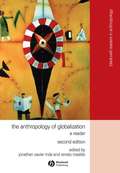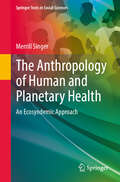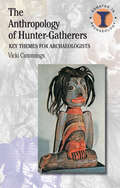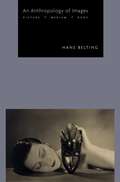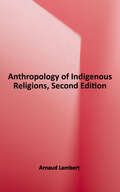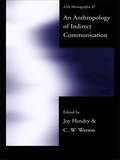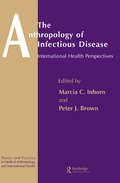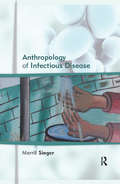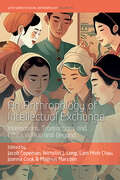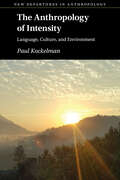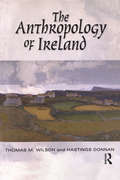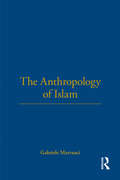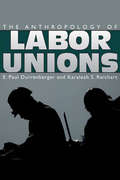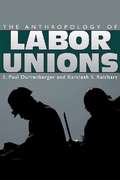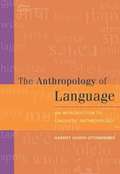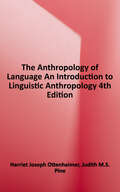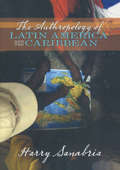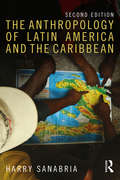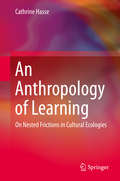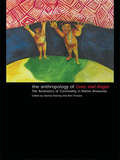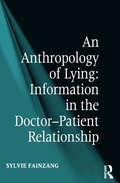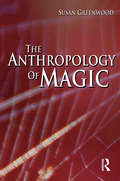- Table View
- List View
The Anthropology of Global Pentecostalism and Evangelicalism
by Simon Coleman Rosalind I. J. HackettThe phenomenal growth of Pentecostalism and evangelicalism around the world in recent decades has forced us to rethink what it means to be religious and what it means to be global. The success of these religious movements has revealed tensions and resonances between the public and the private, the religious and the cultural, and the local and the global. This volume provides a wide ranging and accessible, as well as ethnographically rich, perspective on what has become a truly global religious trend, one that is challenging conventional analytical categories within the social sciences.This book informs students and seasoned scholars alike about the character of Pentecostalism and evangelicalism not only as they have spread across the globe, but also as they have become global movements. Adopting a broadly anthropological approach, the chapters synthesize the existing literature on Pentecostalism and evangelicalism even as they offer new analyses and critiques. They show how the study of Pentecostalism and evangelicalism provides a fresh way to approach classic anthropological themes; they contest the frequent characterization of these movements as conservative religious, social, and political forces; and they argue that Pentecostalism and evangelicalism are significant not least because they encourage us to reflect on the intersections of politics, materiality, morality and law. Ultimately, the volume leaves us with a clear sense of the cultural and social power, as well as the theoretical significance, of forms of Christianity that we can no longer afford to ignore.
The Anthropology of Globalization: A Reader
by Jonathan Xavier Inda Renato RosaldoUpdated with a fresh introduction and brand new selections, the second edition of The Anthropology of Globalization collects some of the decade s finest work on globalization, focusing on the increasing interconnectedness of people around the world, and the culturally specific ways in which these connections are mediated. Provides a rich introduction to the subject Grounds the study of globalization ethnographically by locating global processes in everyday practice Addresses the global flow of capital, people, commodities, media, and ideologies Offers extensive geographic coverage: from Africa and Asia to the Caribbean, Europe, and North America Updated edition includes new selections, section introductions, and recommendations for further reading
The Anthropology of Human and Planetary Health: An Ecosyndemic Approach (Springer Texts in Social Sciences)
by Merrill SingerThis text introduces undergraduate and graduate students in health or environment-related classes to the mounting crisis of syndemics through the lens of planetary health. The concept of syndemics, developed by the author and now in wide use across multiple health-related disciplines, focuses attention on the adverse synergistic interaction of two or more diseases or other health conditions promoted or facilitated by social and/or environmental conditions. The planetary health framework is an emerging holistic medical rethinking of our understanding of health. It seeks to identify the safe environmental limits within which humanity and other species can flourish on our increasingly imperiled planet. This book offers useful conceptual tools and frameworks for developing a comprehensive understanding of approaches needed to address the health risks of our changing world. The unique coverage of this book is its careful examination of ecosyndemics around the world in light of the growing recognition that on a heavily disrupted planet, a narrow focus on human health is inadequate. Under these circumstances, a comprehensive planetary health framework is needed. This approach seriously considers the interconnected nature of human health, animal and plant health, and the health of the world’s ecosystems. Highly descriptive, with numerous cases of the planetary health crisis, the textbook is written in a student-friendly and accessible way and is an important resource for coursework across environment and health-related subjects.
The Anthropology of Hunter-Gatherers: Key Themes for Archaeologists (Debates In Archaeology Ser.)
by Vicki CummingsThis book provides a basic introduction to key debates in the study of hunter-gatherers, specifically from an anthropological perspective, but designed for an archaeological audience. Hunter-gatherers have been the focus of intense anthropological research and discussion over the last hundred years, and as such there is an enormous literature on communities all over the world. Yet, among the diverse range of peoples studied, there are a number of recurrent themes, including not only the way in which people make a living (hunting, gathering and fishing) but also striking similarities in other areas of life such as belief systems and social organisation. These themes are described and then explored through archaeological case-studies. The overarching theme throughout the volume is the use of ethnographic analogy, and how archaeologists should be critical in its use.
The Anthropology of Ignorance
by Casey High Ann H. Kelly Jonathan MairThe question of ignorance occupies a central place in anthropological theory and practice. This volume argues that the concept of ignorance has largely been pursued as the opposite of knowledge or even its obverse. Though they cover wide empirical ground - from clients of a fertility treatment center in New York to families grappling with suicide in Greenland - contributors share a commitment to understanding the concept as a productive, social practice. Ultimately, The Anthropology of Ignorance asks whether an academic commitment to knowledge can be squared with lived significance of ignorance and how taking it seriously might alter anthropological research practices.
An Anthropology of Images: Picture, Medium, Body
by Hans BeltingA compelling theory that places the origin of human picture making in the bodyIn this groundbreaking book, renowned art historian Hans Belting proposes a new anthropological theory for interpreting human picture making. Rather than focus exclusively on pictures as they are embodied in various media such as painting, sculpture, or photography, he links pictures to our mental images and therefore our bodies. The body is understood as a "living medium" that produces, perceives, or remembers images that are different from the images we encounter through handmade or technical pictures. Refusing to reduce images to their material embodiment yet acknowledging the importance of the historical media in which images are manifested, An Anthropology of Images presents a challenging and provocative new account of what pictures are and how they function.The book demonstrates these ideas with a series of compelling case studies, ranging from Dante's picture theory to post-photography. One chapter explores the tension between image and medium in two "media of the body," the coat of arms and the portrait painting. Another, central chapter looks at the relationship between image and death, tracing picture production, including the first use of the mask, to early funerary rituals in which pictures served to represent the missing bodies of the dead. Pictures were tools to re-embody the deceased, to make them present again, a fact that offers a surprising clue to the riddle of presence and absence in most pictures and that reveals a genealogy of pictures obscured by Platonic picture theory.
Anthropology of Indigenous Religions, Second Edition
by Arnaud LambertThe second edition of the Anthropology of Indigenous Religions continues to offer a novel introduction to the ways that anthropologists investigate indigenous religions. The anthropological approach to the study of religion can be viewed as a series of exchanges and debates spanning almost two centuries regarding the nature of religions and its place in human life. This book invites readers to take part in these ongoing conversations while exploring the main elements of the religious life in small-scale societies around the world. New features of the second edition include: - Greater emphasis on both classic and modern anthropological approaches to animism, shamanism, totemism, magic, and witchcraft - Additional topics such as astrology, healers and magical medicine, merit and karma - Revised and expanded treatments of ancestor veneration, soul beliefs, high gods, cosmology, eschatology, religious symbolism, religious objects, shamanism, and magic among others - New charts and graphics to help readers better understand different religious concepts and their anthropological interpretations - New and revised learning activities to help readers engage with the material in the book - Guides to recommended readings for each topic - References to the companion volume, indigenous religions of the world (Lambert 2019), to help readers interpret the ethnographic data presented in that book. Also includes KHQ, a study app that provides students with a variety of study tools that are customized to their course.
An Anthropology of Indirect Communication (ASA Monographs #Vol. 37)
by Joy Hendry C. W. WatsonSometimes we convey what we mean not by what we say but by what we do. This type of indirect communication is sometimes called 'indirection'. From patent miscommunication, through potent ambiguity to pregnant silence this incisive collection examines from a rare anthropological perspective the many aspects of indirect communication. From a Mormon Theme Park to carnival time on Montserrat the contributors analyse indirection by illustrating how food, silence, sunglasses, martial arts and rudeness call constitute powerful ways of conveying meaning. An Anthropology of Indirect Communication is an engaging text which provides a challenging introduction to this subject.
The Anthropology of Infectious Disease: International Health Perspectives (Theory And Practice In Medical Anthropology And International Health Ser. #Vol. 4)
by Peter J. Brown Marcia C. InhornAnthropological contributions to the study of infectious disease and to the study of actual infectious disease eradication programmes have rarely been collected in one volume. In the era of AIDS and the global resurgance of infectious diseases such as tuberculosis and malaria, there is widespread interest and concern about the cultural, ecological and political factors that are directly related to the increased prevalence of infectious disease. In this book, the authors have assembled the growing scholarship in one volume. Chapters explore the coevolution of genes and cultural traits; the cultural construction of 'disease' and how these models influence health-seeking behaviour; cultural adaptive strategies to infectious disease problems; the ways in which ethnography sheds light on epidemiological patterns of infectious disease; the practical and ethical dilemmas that anthropologists face by participating in infectious disease programmes; and the political ecology of infectious disease.
Anthropology of Infectious Disease
by Merrill SingerThis book synthesizes the flourishing field of anthropology of infectious disease in a critical, biocultural framework. Leading medical anthropologist Merrill Singer holistically unites the behaviors of microorganisms and the activities of complex social systems, showing how we exist with pathogenic agents of disease in a complex process of co-evolution. He also connects human diseases to larger ecosystems and various other species that are future sources of new human infections. Anthropology of Infectious Disease integrates and advances research in this growing, multifaceted area and offers an ideal supplement to courses in anthropology, public health, development studies, and related fields.
An Anthropology of Intellectual Exchange: Interactions, Transactions and Ethics in Asia and Beyond (WYSE Series in Social Anthropology #15)
by Jacob Copeman, Nicholas J. Long, Lam Minh Chau, Joanna Cook Magnus MarsdenDialogues, encounters and interactions through which particular ways of knowing, understanding and thinking about the world are forged lie at the centre of anthropology. Such ‘intellectual exchange’ is also central to anthropologists’ own professional practice: from their interactions with research participants and modes of pedagogy to their engagements with each other and scholars from adjacent disciplines. This collection of essays explores how such processes might best be studied cross-culturally. Foregrounding the diverse interactions, ethical reasoning, and intellectual lives of people from across the continent of Asia, the volume develops an anthropology of intellectual exchange itself.
The Anthropology of Intensity: Language, Culture, and Environment (New Departures in Anthropology)
by Paul KockelmanWhat counts as too close for comfort? How can an entire room suddenly feel restless at the imminence of a yet unknown occurrence? And who decides whether or not we are already in an age of unliveable extremes? The anthropology of intensity studies how humans encounter and communicate the continuous and gradable features of social and environmental phenomena in everyday interactions. Focusing on the last twenty years of life in a Mayan village in the cloud forests of Guatemala, this book provides a natural history of intensity in exceedingly tense times, through a careful analysis of ethnographic and linguistic evidence. It uses intensity as a way to reframe Anthropology in the age of the Anthropocene, and rethinks classic work in the formal linguistic tradition from a culture-specific and context-sensitive stance. It is essential reading not only for anthropologists and linguists, but also for ecologically oriented readers, critical theorists, and environmental scientists.
The Anthropology of Intentions
by Alessandro DurantiHow and to what extent do people take into account the intentions of others? Alessandro Duranti sets out to answer this question, showing that the role of intentions in human interaction is variable across cultures and contexts. Through careful analysis of data collected over three decades in US and Pacific societies, Duranti demonstrates that, in some communities, social actors avoid intentional discourse, focusing on the consequences of actions rather than on their alleged original goals. In other cases, he argues, people do speculate about their own intentions or guess the intentions of others, including in some societies where it was previously assumed they avoid doing so. To account for such variation, Duranti proposes an 'intentional continuum', a concept that draws from phenomenology and the detailed analysis of face-to-face interaction. A combination of new essays and classic re-evaluations, the book draws together findings from anthropology, linguistics and philosophy to offer a penetrating account of the role of intentions in defining human action.
The Anthropology of Ireland
by Hastings Donnan Thomas M. WilsonWhere and what is Ireland?--What are the identities of the people of Ireland?--How has European Union membership shaped Irish people's lives and interests?--How global is local Ireland?This book argues that such questions can be answered only by understanding everyday aspects of Irish culture and identity. Such understanding is achieved by paying close attention to what people in Ireland themselves say about the radical changes in their lives in the context of wider global transformation. As notions of sex, religion, and politics are radically reworked in an Ireland being re-imagined in ways inconceivable just a generation ago, anthropologists have been at the forefront of recording the results. The first comprehensive book-length introduction to anthropological research on the island as a whole, The Anthropology of Ireland considers the changing place in a changing Ireland of religion, sex, sport, race, dance, young people, the Travellers, St Patrick's Day and much more.
The Anthropology of Islam
by Gabriele MarranciAn increasing number of people have questions about Islam and Muslims. But how can we approach and study Islam after September 11th? Which is the best methodology to understand an Islam that is changing in a globalized world? The Anthropology of Islam argues that Islam today needs to be studied as a living religion through the observation of everyday Muslim life. Drawing on extensive original fieldwork, Marranci provides provocative analyses of Islam and its relation to issues such as identities, politics, culture, power and gender. The Anthropology of Islam is unprecedented in its innovative and challenging discussion about fieldwork among Muslims, and its ethnographically based interpretations of contemporary aspects of Islam in a post-September 11th society. The book will appeal to those in anthropology and beyond who see and are interested in investigating the unsettled place of Islam in our multicultural society.
The Anthropology of Labor Unions (G - Reference, Information And Interdisciplinary Subjects Ser.)
by E. Paul Durrenberger Karaleah S. ReichartThe Anthropology of Labor Unions presents ethnographic data and analysis in eight case studies from several very diverse industries. It covers a wide range of topics, from the role of women and community in strikes to the importance of place in organization, and addresses global concerns with studies from Mexico and Malawu. Union-organized workplaces consistently afford workers higher wages and better pensions, benefits, and health coverage than their nonunion counterparts. In addition, women and minorities who belong to unions are more likely to receive higher wages and benefits than their nonunion peers. Given the economic advantages of union membership, one might expect to see higher rates of organization across industries, but labor affiliation is at an all-time low. What accounts for this discrepancy? The contributors in this volume provide a variety of perspectives on this paradox, including discussions of approaches to and findings on the histories, cultures, and practices of organized labor. They also address substantive issues such as race, class, gender, age, generation, ethnicity, health and safety concerns, corporate co-optation of unions, and the cultural context of union-management relationships. The first to bring together anthropological case studies of labor unions, this volume will appeal to cultural anthropologists, social scientists, sociologists, and those interested in labor studies and labor movements.
Anthropology of Labor Unions
by E. Paul Durrenberger Karaleah S. ReichartThe Anthropology of Labor Unions presents ethnographic data and analysis in eight case studies from several very diverse industries. It covers a wide range of topics, from the role of women and community in strikes to the importance of place in organization, and addresses global concerns with studies from Mexico and Malawu. Union-organized workplaces consistently afford workers higher wages and better pensions, benefits, and health coverage than their nonunion counterparts. In addition, women and minorities who belong to unions are more likely to receive higher wages and benefits than their nonunion peers. Given the economic advantages of union membership, one might expect to see higher rates of organization across industries, but labor affiliation is at an all-time low. What accounts for this discrepancy? The contributors in this volume provide a variety of perspectives on this paradox, including discussions of approaches to and findings on the histories, cultures, and practices of organized labor. They also address substantive issues such as race, class, gender, age, generation, ethnicity, health and safety concerns, corporate co-optation of unions, and the cultural context of union-management relationships. The first to bring together anthropological case studies of labor unions, this volume will appeal to cultural anthropologists, social scientists, sociologists, and those interested in labor studies and labor movements.
The Anthropology of Language: An Introduction to Linguistic Anthropology (Second Edition)
by Harriet OttenheimerOttenheimer's authoritative yet approachable introduction to the field's methodology, skills, techniques, tools, and applications emphasizes the kinds of questions that anthropologists ask about language and the kinds of questions that intrigue students. The text brings together the key areas of linguistic anthropology, addressing issues of power, race, gender, and class throughout. Further stressing the everyday relevance of the text material, Ottenheimer includes "In the Field" vignettes that draw you in to the chapter material via stories culled from her own and others' experiences, as well as "Doing Linguistic Anthropology" and "Cross-Language Miscommunication" features that describe real-life applications of text concepts.
The Anthropology of Language: An Introduction to Linguistic Anthropology
by Harriet Joseph Ottenheimer Judith M. S. PineLearn the methodology, skills, techniques, tools, and applications of Linguistic Anthropology with The Anthropology of Language: An Introduction to Linguistic Anthropology. This highly readable introductory text emphasizes the kinds of intriguing questions that anthropologists ask about language. The fourth edition brings together the key areas of linguistic anthropology, addressing issues of power, race, gender and class throughout. "In the Field" vignettes draw you into the chapter material and are culled from authors Ottenheimer and Pine's own experiences, among others. Other features--"Doing Linguistic Anthropology" and "Cross-Language iscommunication"--describe some of the real-life applications of concepts discussed in the text, helping you cement your understanding of the concepts and their relevance.
The Anthropology of Latin America and the Caribbean
by Harry SanabriaThe first single-authored comprehensive introduction to major contemporary research trends, issues, and debates on the anthropology of Latin America and the Caribbean. The text provides wide and historically informed coverage of key facets of Latin American and Caribbean societies and their cultural and historical development as well as the roles of power and inequality. Cymeme Howe, Visiting Assistant Professor of Cornell University writes, "The text moves well and builds over time, paying close attention to balancing both the Caribbean and Latin America as geographic regions, Spanish and non-Spanish speaking countries, and historical and contemporary issues in the field. I found the geographic breadth to be especially impressive." Jeffrey W. Mantz of California State University, Stanislaus, notes that the contents "reflect the insights of an anthropologist who knows Latin America intimately and extensively."
The Anthropology of Latin America and the Caribbean
by Harry SanabriaThis wide-ranging introduction to the anthropology of Latin America and the Caribbean offers broad coverage of culture and society in the region, taking into account historical developments as well as the roles of power and inequality. The chapters address key topics such as colonialism, globalization, violence, religion, race and ethnicity, gender and sexuality, health, and food, and emphasize the impact of Latin American and Caribbean peoples and cultures in the United States. The text has been thoroughly updated for the second edition, including fresh case studies and new chapters on independence, neoliberalism and immigration, and popular culture and the digital revolution. Students are provided with a solid overview of the major contemporary trends, issues, and debates in the field. Each chapter ends with a summary, up-to-date recommendations for viewing films/videos and websites, and a comprehensive bibliography for further reading and research.
An Anthropology of Learning: On Nested Frictions in Cultural Ecologies
by Cathrine HasseThis book has one explicit purpose: to present a new theory of cultural learning in organisations which combines practice-based learning with cultural models - a cognitive anthropological schema theory of taken-for-granted connections - tied to the everyday meaningful use of artefacts. The understanding of culture as emerging in a process of learning open up for new understandings, which is useful for researchers, practitioners and students interested in dynamic studies of culture and cultural studies of organisations. The new approach goes beyond culture as a static, essentialist entity and open for our possibility to learn in organisations across national cultures, across ethnicity and across the apparently insurmountable local educational differences which makes it difficult for people to communicate working together in an increasingly globalized world. The empirical examples are mainly drawn from organisations of education and science which are melting-pots of cultural encounters.
The Anthropology of Love and Anger: The Aesthetics of Conviviality in Native Amazonia
by Joanna Overing Alan PassesThe Anthropology of Love and Anger questions the very foundations of western sociological thought. In their examination of indigenous peoples from across the South American continent, the contributors to this volume have come to realise that western thought does not possess the vocabulary to define even the fundamentals of indigenous thought and practice. The dualisms of public and private, political and domestic, individual and collective, even male and female, in which western anthropology was founded cannot legitimately be applied to peoples whose 'sociality' is based on an 'aesthetics of community'.For indigenous people success is measured by the extent to which conviviality, (all that is peaceful, harmonious and sociable) has been attained. Yet conviviality is not just reliant on love and good but instead on an even balance between all that is constructive, love, and all that is destructive, anger.With case studies from across the South American region, ranging from the (so-called) fierce Yanomami of Venezuela and Brazil to the Enxet of Paraguay, and with discussions on topics from the efficacy of laughter, the role of language, anger as a marker of love and even homesickness, The Anthropology of Love and Anger is a seminal, fascinating work which should be read by all students and academics in the post-colonial world.
An Anthropology of Lying: Information in the Doctor-Patient Relationship
by Sylvie FainzangIn the era of health democracy, where a patient’s right to be informed is not only widely advocated but also guaranteed by law, what is the real situation regarding patient information? Do patients receive the information that they request with regard to their diagnosis, prognosis or treatments? And what information do patients themselves give to their doctors? Drawing on observational research in hospitals and covering the exchanges between doctors and patients on the subject of cancer treatment and that of other pathologies, this book reveals that the practice of telling lies is widespread amongst parties on both sides of the medical relationship. With attention to the manner in which information of various types is withheld and the truth concealed on either side of the doctor-patient relationship, the author explores the boundaries between what is said and what is left unsaid, and between those who are given information and those who are lied to. Considering the misunderstandings that occur in the course of medical exchanges and the differences between the lies told by doctors and patients, An Anthropology of Lying: Information in the Doctor-Patient Relationship analyses the role of mendacity in the exercise of, and resistance to power. A fascinating study of the mechanisms at work and social conditions surrounding the accomplishment of lying in medical settings, this book casts fresh light on a subject that has so far been overlooked. As such, it will appeal not only to sociologists and anthropologists of health and medicine, but also to medical professionals.
The Anthropology of Magic: An Anthropology Of Consciousness
by Susan GreenwoodMagic is arguably the least understood subject in anthropology today. Exotic and fascinating, it offers us a glimpse into another world but it also threatens to undermine the foundations of anthropology due to its supposed irrational and non-scientific nature. Magic has thus often been 'explained away' by social or psychological reduction. The Anthropology of Magic redresses the balance and brings magic, as an aspect of consciousness, into focus through the use of classic texts and cutting-edge research. Suitable for student and scholar alike, The Anthropology of Magic updates a classical anthropological debate concerning the nature of human experience. A key theme is that human beings everywhere have the potential for magical consciousness. Taking a new approach to some perennial topics in anthropology - such as shamanism, mythology, witchcraft and healing - the book raises crucial theoretical and methodological issues to provide the reader with an engaging and critical understanding of the dynamics of magic.Join the live discussion on Facebook!
